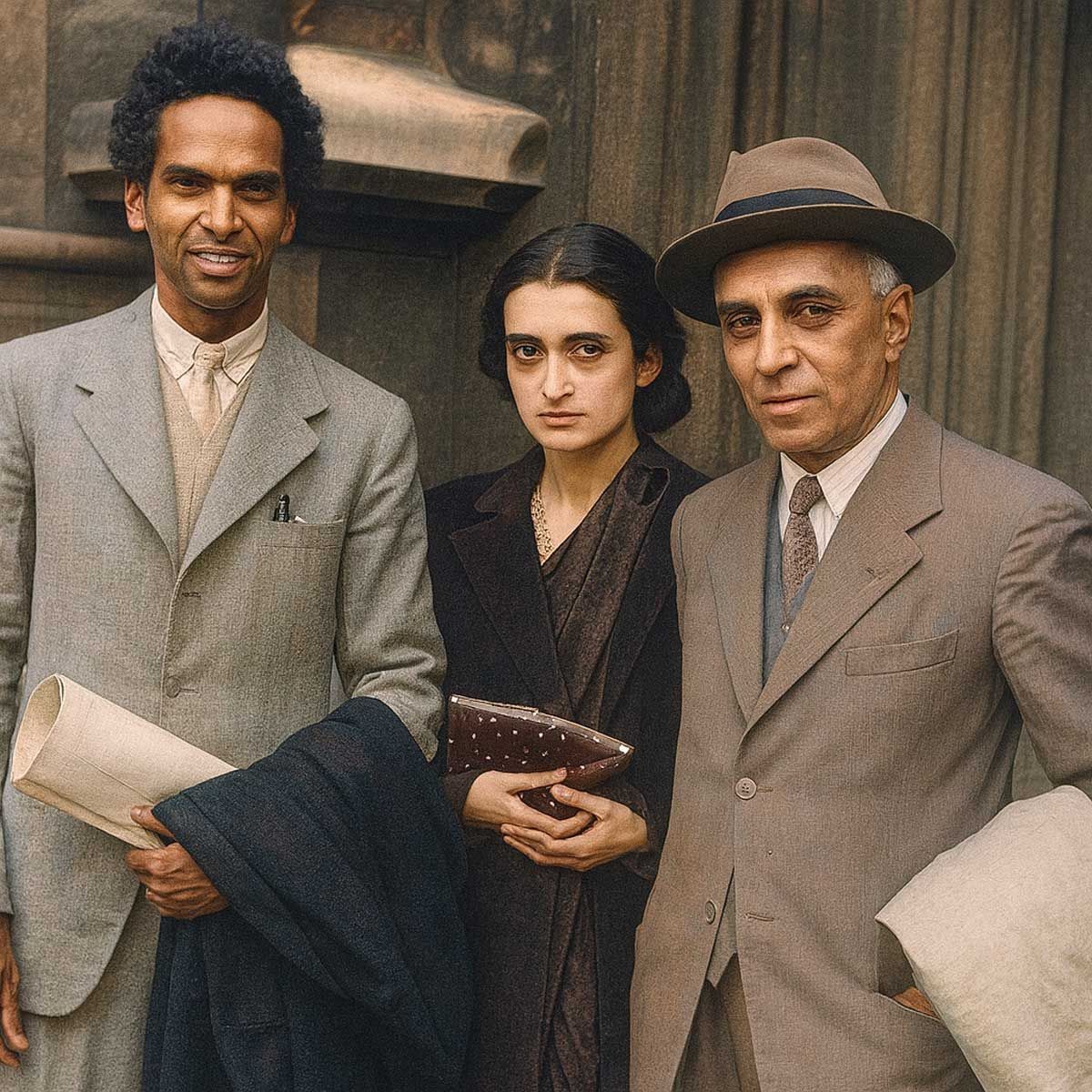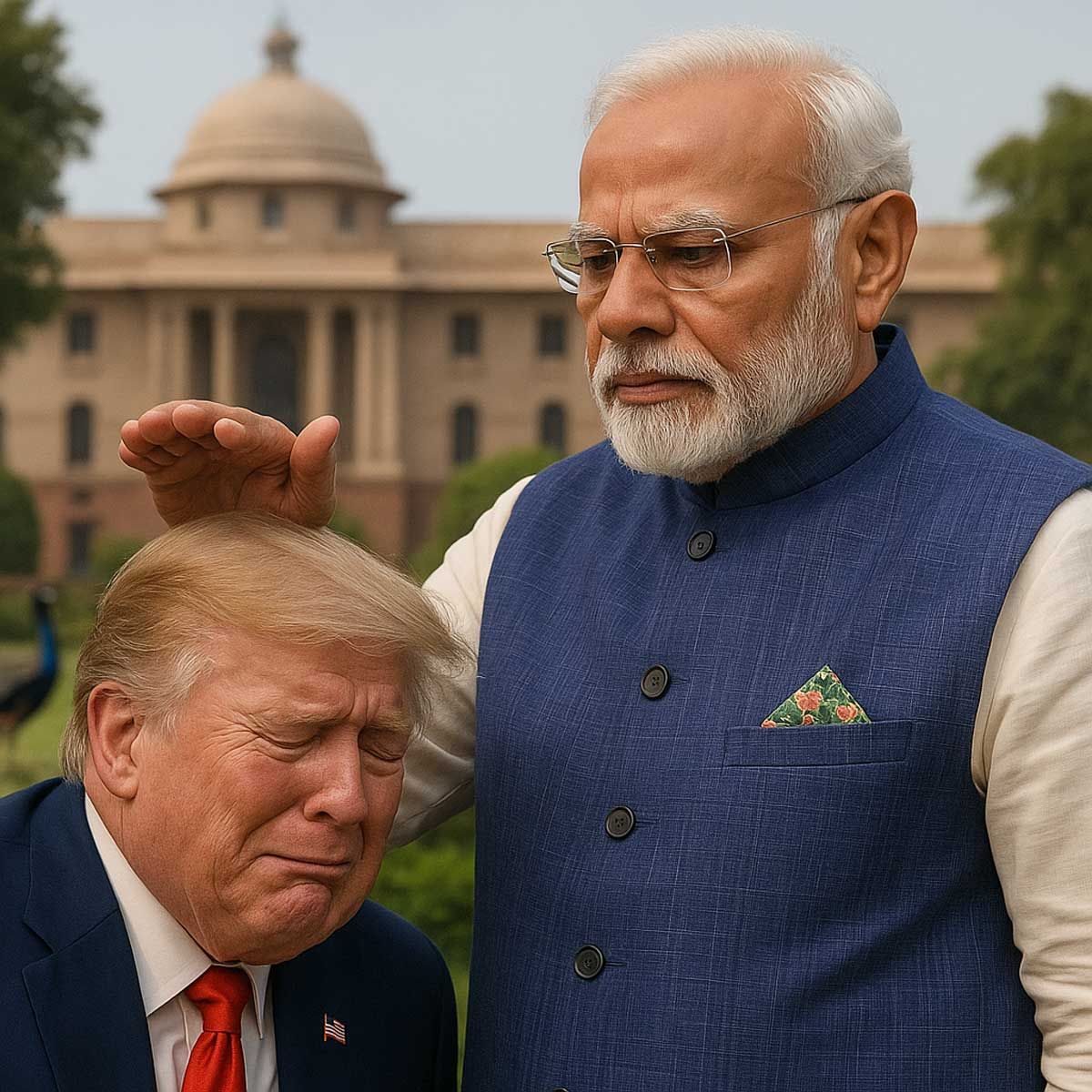Sanatan Articles
Satyaagrah
Written on
Satyaagrah
Written on
Satyaagrah
Written on
Satyaagrah
Written on
Satyaagrah
Written on
JOIN SATYAAGRAH SOCIAL MEDIA
Nehru’s blind trust in China and dismissal of military warnings weakened India; the reckless Forward Policy led to the 1962 war disaster, a humiliating defeat that exposed his greatest defence blunder and forced him to admit his grave mistake

“The art of war is of vital importance to the State. It is a matter of life and death, a road either to safety or to ruin. Hence it is a subject of inquiry which can on no account be neglected.” —Sun Tzu, Art of War
For any nation that had endured centuries of foreign domination, security should have been the first priority after freedom. India, ruled for nearly a thousand years—first by invading Muslim rulers and later by the British—was expected to safeguard its sovereignty with utmost seriousness after independence in 1947. Yet, the leadership that emerged in free India did not share that urgency.
Instead of focusing on building a strong military foundation, Prime Minister Jawaharlal Nehru and the Congress leadership chose to embrace an idealistic philosophy, influenced heavily by non-violence, pacifism, and Gandhian thought. This worldview, noble in intent but impractical in execution, led to a dangerous neglect of India’s external security needs. As a result, India’s defence strategy was often shaped by wishful thinking rather than pragmatic realpolitik.
Nehru’s approach revealed a startling lack of awareness of what it took for a country as vast and vulnerable as India to protect itself. He neither resolved the long-standing border dispute with China nor invested adequately in defending the territories India claimed as its own. The demands for modernization of the military and strengthening of the defence establishment were consistently ignored by Nehru and his Defence Minister, V.K. Krishna Menon.
This complacency has been documented by several observers. SK Verma in “1962: The War That Wasn't” wrote: “With Bose’s exit and Sardar Patel’s death in 1950, there was no one who could provide the necessary inspiration for the reconstruction of an army (that had so far served British interests) into an integrated military instrument that could identify potential threats and tackle them militarily. Nehru, unlike Bose and Patel, veered away from building military power.”
Similarly, Jaswant Singh observed that “independent India simply abandoned the centrality of strategic culture as the first ingredient of vigorous and bold national policies.”
This mindset, critics argue, sowed the seeds of the humiliating defeat that India faced in the 1962 war against China. One shocking incident illustrates the gravity of this neglect. Soon after independence, India’s first Army Chief, Lt. General Sir Robert Lockhart, presented a strategic defence plan to the Prime Minister. As per military protocol, such a plan required government directives. But Nehru’s reaction stunned the general. Lockhart recalled: “The PM took one look at my paper and blew his top. ‘Rubbish! Total rubbish! We don’t need a defence plan. Our policy is ahimsa [non-violence]. We foresee no military threats. Scrap the army! The police are good enough to meet our security needs’, shouted Nehru.”
|
True to his words, Nehru proceeded to reduce the army by nearly 50,000 soldiers at a time when Kashmir was under threat and China had already entered Tibet. This was a move that weakened India’s security posture at a most crucial moment.
The shortsightedness extended beyond land forces. MO Mathai noted regarding the visit of Khrushchev and Bulganin to India: “Several times Khrushchev emphasised the need for a first-class aircraft industry for a large country like India and volunteered to send some of Soviet Union’s best experts in the field. Somehow it did not register with Nehru and no follow-up action was taken. It was only after the Chinese invasion that we woke up to the grim realities and secured Soviet collaboration in the production of modern military aircraft.”
Other accounts highlight Nehru’s casual dismissal of military preparedness. RNP Singh in Nehru: A Troubled Legacy quoted Nehru as saying that the nation could defend itself with “lathis [sticks] and stones if need be” and added: “Therefore, I am not afraid of anybody invading India from any quarter.” In Parliament, Nehru even advised: “If you better your morale and determine not to surrender, nothing can conquer you.” At another press conference, he remarked: “I think the proper way to consider defence is to begin to forget the military aspect.”
With such a mindset at the top, India was ill-prepared for any serious confrontation. When the 1962 war came, disaster was inevitable. As critics later noted, not even divine intervention could have saved the country from humiliation when its own leadership had willfully neglected the army’s modernization and ignored strategic alliances.
By 1960, Army Chief General P.N. Thapar had already warned the government that India’s military equipment was outdated and inadequate, especially compared to China and even Pakistan. Before launching operations against China to reclaim disputed areas, he reminded Nehru that the army was poorly equipped and unprepared. Though Nehru verified these concerns with senior staff, he refused to change course, insisting that China would not retaliate. Years later, General Thapar confessed to journalist Kuldip Nayar: “Looking back, I think I should have submitted my resignation at that time. I might have saved my country from the humiliation of defeat.”
This string of misjudgments showed how misplaced idealism, neglect of strategic culture, and lack of military foresight exposed India to one of the gravest national humiliations in modern history.
|
Illusions of Security and the Road to 1962
Nehru’s government built its defence strategy on the dangerous presumption that “China would not attack” India. This misplaced belief shaped policies and decisions at the highest level. Durga Das wrote: “If [Krishna] Menon was guilty of hugging the illusion [that ‘China would not attack’], so was Nehru, perhaps to a greater degree. He openly ticked off General Thimayya, Chief of Army Staff, at a Governor’s Conference months earlier for even suggesting the possibility of an attack by China. Many others in the cabinet were not innocent. Either through ignorance or fear of going contrary to the Prime Minister [that was Nehruvian democracy, FoE, and quality of Cabinet System of Government for you!], they endorsed his complacent attitude.”
This arrogance was not without consequences. In July 1962—barely three months before war—Army Chief General P.N. Thapar urgently requested additional funds to correct glaring deficiencies in weapons and equipment. But when the proposal reached Nehru, he dismissed it with the remark that China would not resort to force.
The military leadership had repeatedly warned Nehru and Defence Minister Krishna Menon that India was severely outmatched by China—out-gunned, out-tanked, and out-manned. Yet, instead of strengthening defences, the government pushed its ill-conceived “Forward Policy,” which left border outposts dangerously exposed.
|
Years earlier, Army Chief General K.S. Thimayya had raised the same concerns. His frustration at being ignored was reflected in his farewell speech on retirement in 1961. Addressing his soldiers, he said: “I hope I am not leaving you as cannon fodder for the Chinese. God bless you all!” Thimayya had earlier been blunt in his assessment: “I cannot, even as a soldier, envisage India taking on China in an open conflict on its own. China’s present strength in man-power, equipment and aircraft exceeds our resources a hundredfold with the full support of the USSR and we could never hope to match China in the foreseeable future. It must be left to the politicians and diplomats to ensure our security.”
The lack of foresight was also observed by Brigadier John Dalvi, who fought in the 1962 war and later wrote with searing honesty: “There was no overall political objective; no National Policy; no grand strategy and total unreadiness for military operations in the awesome Himalayan mountains, against a first-class land power... We did not study the pattern of weapons and communications equipments that we may require. Army Schools of Instruction were oriented towards open warfare. There was little emphasis on mountain warfare despite the Army’s deployment in Kashmir from 1947... The Army was forgotten; its equipment allowed to become obsolete, certainly obsolescent; and its training academic and outdated. We merely tried to maintain what we had inherited in 1947...The political assumptions of our defence policies were invalid and dangerous...”
Brig. Dalvi further added: “In October 1962 Indians were shocked beyond words to discover that we had no modern rifle, although we were supposed to be ready to ‘manufacture’ an aircraft; and had the know-how to make an atom-bomb... Assam Rifles posts [under the forward policy] were deployed non-tactically and they were ill-armed and even worse equipped that the Regular Army. At best, they could only function as border check-posts and yet their task was ‘to fight to the last man and the last round’...There were no inter-communication facilities between Assam Rifles’ posts and the nearest Army sub-unit...The standard explanation was that there was a general shortage of wireless sets in the country. The Assam Rifles was a separate private army of the External Affairs Ministry. And who would dare bell the cat about the extraordinary command system?”
Warnings also came from the field. At a Defence Council meeting in September 1962, just a month before the Chinese assault, the Army Commander in Ladakh openly declared: “If China attacks massively, we shall be annihilated.” The head of the Eastern Command echoed the same fear: “If China decides to come down in a big way, we are in no position to hold it anywhere in NEFA.”
Despite these chilling assessments, soldiers were sent to fight under hopeless conditions. Ill-prepared, poorly supplied, and inadequately armed, Indian troops faced the freezing heights of the Himalayas with little more than courage. Hunger, cold, and lack of equipment defined their battlefront. The neglect of essentials was so severe that, during the much smaller 1961 Goa operation against the Portuguese, “one battalion was short of 400 pair of footwear and went into the battle in PT shoes,” as narrated by General B.M. Kaul.
And yet, in stark contrast to the harsh realities, Nehru continued to project confidence in Parliament. He made the following sweeping claim: “I can tell this House that at no time since our independence, and of course before it, were our defence forces in better condition, in finer fettle...than they are today. I am not boasting about them or comparing them with any other country’s, but I am quite confident that our defence forces are well capable of looking after our country.”
The gap between rhetoric and reality could not have been wider.
|
The Final Admission of Failure
Critics often described Nehru’s misplaced confidence with biting sarcasm—“The Nabob of Cluelessness,” as someone remarked. His bold declarations in Parliament reflected the illusion under which his government operated. Just before the 1962 India-China war, he assured the nation: “I can tell this House [Parliament] that at no time since our independence, and of course before it, were our defence forces in better condition, in finer fettle...than they are today…”
The reality, however, was starkly different. India’s top generals had been raising alarm bells for years. In his farewell speech in 1961, the retiring Army Chief, General K.S. Thimayya, spoke words that would prove tragically prophetic: “I hope I am not leaving you as cannon fodder for the Chinese. God bless you all.”
Yet, Nehru continued to insist that the possibility of an attack from China was unimaginable. With complete certainty, he declared: “It is completely impracticable for the Chinese Government to think of anything in the nature of invasion of India. Therefore I rule it out...”
This casual dismissal of reality created a dangerous bubble around India’s leadership. The country’s foreign and defence policies drifted away from practical needs into a world of assumptions. In the words of one observer: “We were getting out of touch with reality in the modern world and we were living in an artificial atmosphere of our creation...”
The eventual betrayal by China came as a crushing blow. India had extended goodwill and diplomatic warmth towards Beijing, but in return, the nation faced aggression across its borders. The disappointment was summed up by the admission: “We feel India has been ill-repaid for her diplomatic friendliness toward Peking... Difficult to say the Chinese have deliberately deceived us... We may have deceived ourselves...”
Nehru Admits His Blunder
Even Nehru’s own official biographer, S. Gopal, could not gloss over the enormity of the failure. He wrote: “Things went so wrong that had they not happened it would have been difficult to believe them.”
Nehru himself eventually confessed to the colossal miscalculation that had left India vulnerable. In his own words, he admitted: “We were getting out of touch with reality in the modern world and we were living in an artificial atmosphere of our creation...”
He also recognized the bitter truth that India’s trust in China had been misplaced: “We feel India has been ill-repaid for her diplomatic friendliness toward Peking... Difficult to say the Chinese have deliberately deceived us... We may have deceived ourselves...”
This rare acknowledgment from Nehru was both a confession of his government’s failure and an illustration of how dangerous it can be when wishful thinking replaces national security planning.
 Support Us
Support Us
Satyagraha was born from the heart of our land, with an undying aim to unveil the true essence of Bharat. It seeks to illuminate the hidden tales of our valiant freedom fighters and the rich chronicles that haven't yet sung their complete melody in the mainstream.
While platforms like NDTV and 'The Wire' effortlessly garner funds under the banner of safeguarding democracy, we at Satyagraha walk a different path. Our strength and resonance come from you. In this journey to weave a stronger Bharat, every little contribution amplifies our voice. Let's come together, contribute as you can, and champion the true spirit of our nation.
 |  |  |
| ICICI Bank of Satyaagrah | Razorpay Bank of Satyaagrah | PayPal Bank of Satyaagrah - For International Payments |
If all above doesn't work, then try the LINK below:
Please share the article on other platforms
DISCLAIMER: The author is solely responsible for the views expressed in this article. The author carries the responsibility for citing and/or licensing of images utilized within the text. The website also frequently uses non-commercial images for representational purposes only in line with the article. We are not responsible for the authenticity of such images. If some images have a copyright issue, we request the person/entity to contact us at This email address is being protected from spambots. You need JavaScript enabled to view it. and we will take the necessary actions to resolve the issue.
Related Articles
- "It cannot be when the root is neglected that what springs from it will be well ordered": Nehru shouted, 'Total rubbish! We don’t need a defence plan. Our policy is ahimsa. We foresee no military threats. Scrap Army! Police are good enough for security’
- When Nehru ignored warnings from Sardar Patel and Sri Aurobindo and shocked USA President: Chinese Betryal and loss of centuries old ally
- British PM accepted that “the tide of nationalism is running very fast in India" and the mutiny of the Royal Indian Navy in 1946 forced colonial masters Britain to leave India: What followed was betrayal by Congress
- "Betrayal is the birthplace of resentment": Diving into murky depths of Nehru & Elwin's policies in Northeast India unveils a legacy of disruption, a region converted, culture exploited & nation betrayed - glaring testament to their ill-conceived actions
- Nehru's Himalayan Blunders which costed India dearly - Pre-Independence
- "Not a pin was manufactured, really?": Indians counter Congress leader's claims, asserting Nehru's socialist zeal post-Independence crippled Indian industries, debunking myths of his economic ingenuity & exposing enduring consequences on national progress
- The untold story of Maharashtrian Brahmin genocide committed by Congress after Gandhi’s assassination in 1948
- The first large-scale massacre in Independent India accounts for one of the biggest coverups in modern history: It is about time we talk about the 1948 genocide of Maharashtrian Brahmins following MK Gandhi’s assassination
- Harmonizing Nathuram Godse: Why India should move beyond denouncing him, a man who altered the course of not only the politics of the country but the very history of the Hindu Civilisation and, by extension, the world at large
- On 15 Aug 1947, Chakmas proudly hoisted India’s flag, but just 2 days later, Nehru turned his back on them—refusing help as Radcliffe handed their 98% non-Muslim homeland to Pakistan, leaving 17 Aug etched as Chakma Black Day of betrayal and loss
- If only India’s partition chilling wound was not enough, Gandhi did his last protest again only to blackmail India into giving 55 crores to Pakistan, dragged Hindu, Sikh refugees seeking shelter in mosques to die in cold: And we call him Mahatma, not for
- When Secular Nehru Opposed Restoration Of Somnath Temple - The Somnath Temple treachery
- "In loyalty's absence, betrayal finds its stage": Indians sacrificed their life earnings to Netaji for a dream called freedom, Nehru, however, fancied a different richness: gifting it to Pakistan, Legacy decisions, they call it was one more great betrayal
- India captured Haji Pir Pass in 1965 after a daring operation, but returned it in 1966 at Tashkent, losing a vital infiltration block; decades later, that strategic blunder by Congress still fuels cross-border terror and haunts India’s national security
- During ‘Kheti Bachao Yatra’ in Kurukshetra Shehjada Gandhi claimed of throwing China out from Indian Territory ‘in 15 minutes’: From Nehru’s Himalayan blunder to UPA’s silence as China took over Indian land in Ladakh





















